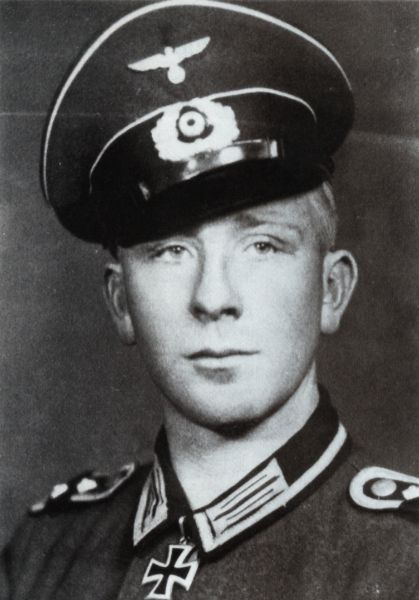Stühmer, Gustav
- Date of birth:
- April 8th, 1914 (Elsfleth-Neuenfelde/Oldenburg, Germany)
- Date of death:
- February 16th, 1944 (Narva, Estonia)
- Buried on:
- German War Cemetery Toila
- Nationality:
- German
Biography
Gustav Stühmer was born on April 8th, 1914 in Elsfleth, Oldenburg. Between 1935 and 1937 he was enlisted in the Infanterie-Regiment 58.
When war started he was once again drafted and placed with the 8. / Infanterie-Regiment 399.
From June 1941, the unit was put into action on the southern area of the Eastern Front. From August, Stühmer was appointed Zugführer with 11.Kompanie. After the fightings at the Crimea, the unit was placed in the front near Sebastopol. In August 1942, the unit with Stühmer was relocated to the Leningrad frontier. From october the unit fought on the banks of the Newa near Dubrowka. In January 1944 the Soviet troops advanced in the Leningrad and Nowgorod area. The unit of Stühmer here fought on the heights near Duderhof.
On February 16th, 1944 the unit was near Narwa in Estonia.
Here, Gustav Stühmer and his REgimental Commander Oberst Griesbach, were suprised by a granade attack on the Regimental headquarters near Waiware. During the attakc, Griesbach was severely wounded and Stühmer was killed. Stühmer was buried on the Heldenfriedhof in Toila, Estonia.
Promotions:
29th December 1942: Oberfeldwebel.
Career:
1935 - 1937: Drafted for service Infanterie-Regiment 58;
September 1939: Drafted for warservice 8. / Infanterie-Regiment 399;
August 1941: Zugführer 11. / infanterie-Regiment 399.
Do you have more information about this person? Inform us!
- Period:
- Second World War (1939-1945)
- Awarded on:
- July 10th, 1941
- Period:
- Second World War (1939-1945)
- Awarded on:
- August 19th, 1941
- Period:
- Second World War (1939-1945)
- Rank:
- Feldwebel der Reserve
- Unit:
- Zugführer, 11. Kompanie, III. Bataillon, Infanterie-Regiment 399, 170. Infanterie-Division, Heer
- Awarded on:
- August 3rd, 1942
Award 156/17.
Award document dated 3rd August 1942 with the rank of Oberfeldwebel.
- Period:
- Second World War (1939-1945)
- Rank:
- Feldwebel der Reserve
- Unit:
- Zugführer, 11. Kompanie, III. Bataillon, Infanterie-Regiment 399, 170. Infanterie-Division, Heer
- Awarded on:
- November 27th, 1942
- Period:
- Second World War (1939-1945)
- Rank:
- Oberfeldwebel der Reserve
- Unit:
- Zugführer, 11. Kompanie, III. Bataillon, Infanterie-Regiment 399, 170. Infanterie-Division, Heer
- Awarded on:
- December 29th, 1942
1400th Award.
Was promoted to Oberfeldwebel at the same date.
Vorläufiges Besitzzeugnis presented on December 30th, 1942.
- Period:
- Second World War (1939-1945)
- Rank:
- Oberfeldwebel der Reserve
- Unit:
- Zugführer, 11. Kompanie, III. Bataillon, Infanterie-Regiment 399, 170. Infanterie-Division, Heer
- Awarded on:
- March 6th, 1944
422nd Award.
Vorläufiges Besitzzeugnis presented on March 10th, 1944.
Proposed on February 25th, 1944.
Awarded posthumously.
- Period:
- Second World War (1939-1945)
- Period:
- Second World War (1939-1945)
Sources
- Photo 1: Wehrkundearchiv
- Photo: Deutsches Wehrkundearchiv
- - THOMAS, FRANZ & WEGMANN, GÜNTER, Die Eichenlaubträger 1940-1945, Biblio-Verlag, 1998.
- Die Ordensträger der Deutschen Wehrmacht (CD), VMD-Verlag GmbH, Osnabrück, 2002
- Kwasny A., Kwasny G., Die Eichenlaubträger 1940-1945 (CD), Deutsches Wehrkundearchiv, Lage-Waddenhausen, 2001
- Fellgiebel W.P., Elite of the Third Reich, The recipients of the Knight's Cross of the Iron Cross 1939-1945: A Reference, Helion & Company Limited, Solihull, 2003, ISBN 1-874622-46-9
- Patzwall K., Scherzer V., Das Deutsche Kreuz 1941-1945, Geschichte und Inhaber Band II, Verlag Klaus D. Patzwall, Norderstedt, 2001, ISBN 3-931533-45-X
- Verleihungsurkunde DKiG
- Vorläufiges Besitzzeugnis RK, EL
- Die Träger des Ritterkreuzes des Eisernen Kreuzes 1939-1945










